

Deacon-structing New Life: Waste Management
Deacon Pedro
Sunday, April 19, 2015
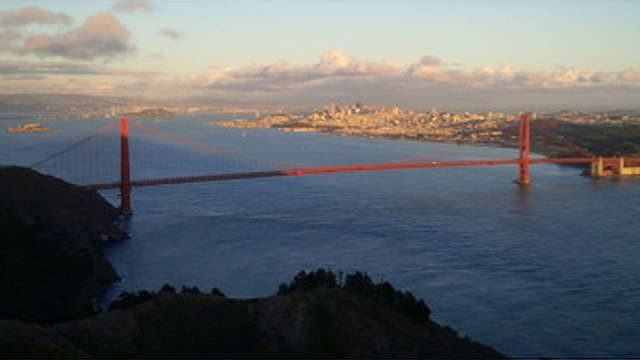
On Easter Sunday I wrote that it’s not hard to find physical signs of new life and resurrection everywhere we look. In fact, I would say that one of the arguments for life after death and even for the divine life is the fact that there are physical signs everywhere. Whether it’s a seed that dies in order to bear fruit, winter melting into spring or people overcoming challenges in order to do great good, resurrection is all around us. In fact, I am reminded of new life, once a week, when I take my recycling and composting bins out to the curb.
Recently, as part of our Creation series pre-production, I was corresponding with Robert Reed, Public Relations Manager at San Francisco’s Recology. Almost immediately I received a response from Fr. Bob Reed at Catholic TV in Boston. Fr. Bob wrote, “Nice to hear from you Deacon Pedro, but I think this email was intended for someone else.” I responded right away to apologize: “Fr. Bob, what a nice opportunity to hear from you. Did you know that you have a “brother” with the same name that works in waste management in San Francisco?” Fr. Bob responded: “What a coincidence! I am in waste management too – the spiritual kind.” And so began my journey into the world of waste management.
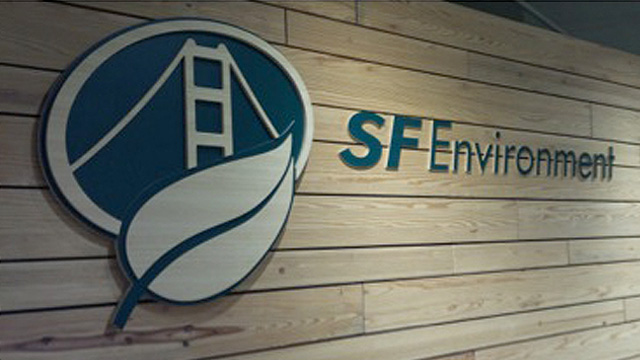
In California we went to The San Francisco Department of the Environment or SF Environment. They are the municipal department dedicated to creating policies and programs that promote social equity, protect human health, and lead the way toward a sustainable future. They have green building, toxics reduction and clean transportation programs, programs to do with climate change, energy, urban agriculture and environmental justice, as well as a zero waste program.
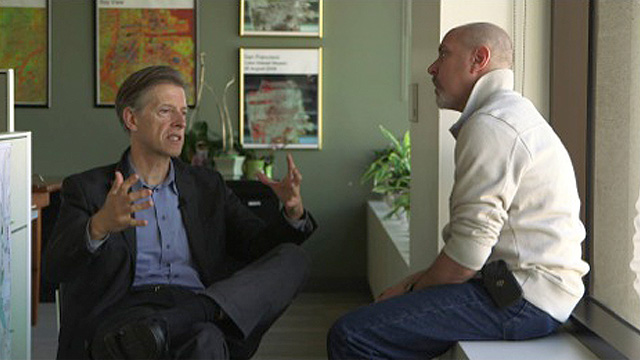
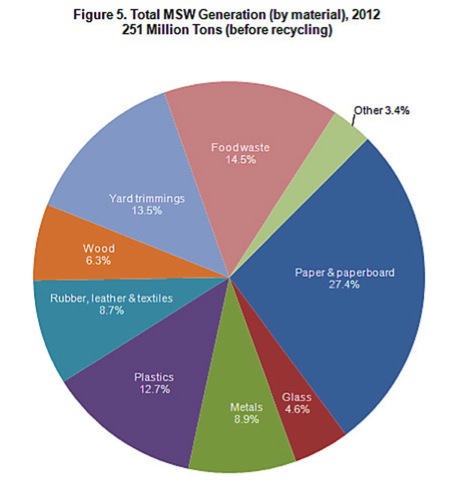
Part of the waste problem is that we don’t see it. When you arrive at SF Environment, the first thing you see is an 8 ft pile of clothing. The caption reads, “Every 7 minutes San Franciscans thrown 560 pounds of textiles into landfill – the equivalent of this 8-foot tower or textiles.” According to the U.S. Environmental Protection Agency, in 2012, Americans generated about 251 million tons of waste. Of this material, only 87 million tons was either recycled or composted. That’s only 34.5%. That means that, on average, Americans recycled and composted 1.51 pounds of our individual waste generation of 4.38 (2kgs) pounds per person per day. According to Environment Canada, the average Canadian produces 1.8 kilograms (4lbs.) of waste per day!
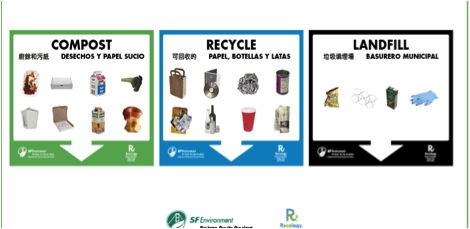
Today in San Francisco, they are able to compost or recycle 90% of people’s waste. That means that mostly everything, construction debris, rubber, metals, batteries, empty paint containers, textiles, shoes, electronics, light bulbs, furniture and household appliances can be recycled, and food scraps, organic waste, soiled paper products, and yard waste can be composted.
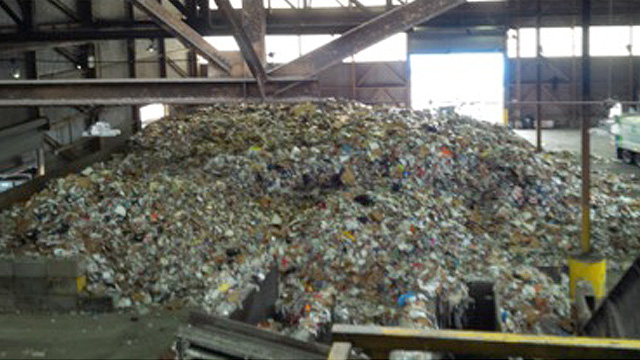
Robert Reed (from Recology, not the priest) took us to one of their Recycling Facilities. The plant at Pier 96 receives paper, cardboard, plastics and glass. Robert explained how recycling saves resources like water. By recycling glass, we achieve 50% in water savings. By recycling paper, we help paper mills reduce their water use by up to 60%. Recycling also reduces energy use. Recycling newsprint, for example, results in an almost 40% reduction in total energy demand. Recycled aluminum provides a 94% reduction in energy use compared with making aluminum from virgin ore. Recycling also keeps materials out of landfills and incinerators. Recycling also avoids pollution. More importantly, recycling means that industries reduce their need to extract more timber, crude oil and ores. By reducing extraction from natural resources we help protect natural habitats and biodiversity. This also helps reduce pollution.
Lastly, as we saw at the Pier 96 plant, recycling creates 10 times more jobs than landfilling or incineration.
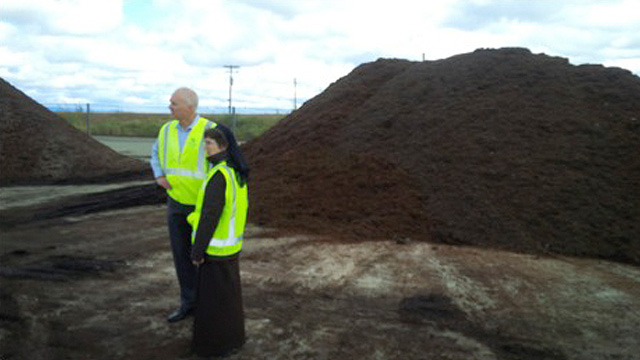
Robert Reed then took us to a compost facility. This used to be a landfill. Basically, when waste goes into a landfill, it is sealed so that toxic substances cannot leak into the soil. Because there is no oxygen, the waste does not biodegrade. If you have the choice of throwing out organic waste or paper into the garbage or in your green bin – consider that what goes in the garbage, if it ends up in a landfill, will not biodegrade. Sr. Damien-Marie Savino, fse, who is a doctor in environmental engineering and chair of the Environmental Science and Studies department at the University of St. Thomas – Houston (and who is working closely with us on Creation), remembers her early days as a student, doing research at a landfill in Puerto Rico. She says that when they uncovered the waste, it was like a time capsule. She was able to find newspapers from the 1920s that had not decomposed. She was able to read them!
On top of that, when organic waste is compressed into a landfill without oxygen, methane gas is produced. Robert Reed told us that more carbon pollution results from this methane gas than from the carbon produced by vehicles on the road. Landfills are not a good idea. Jack Macy at SF Environment commented that in nature there is no waste; everything is used. Robert Reed would agree. This is what composting does; what God intended.
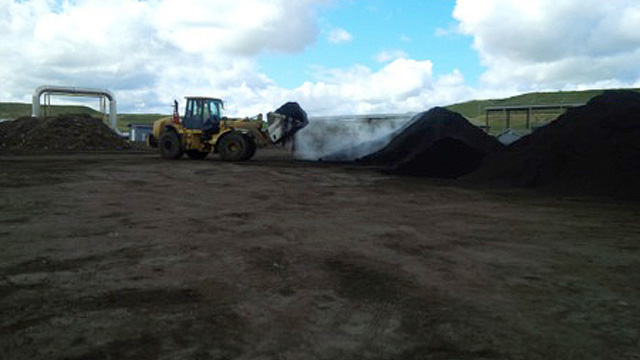
Compost improves soil health and protects topsoil from erosion. Compost promotes healthy microbial activity in soil, providing micronutrients to plant roots, and discouraging soil diseases. Composting returns nutrients to farms so they can grow healthy fruits and vegetables. As opposed to landfills which are producing methane gas, compost sequesters carbon deep in the soil. This means that carbon that is produced by fossil fuel emissions can be recaptured into the soil (where it belongs). Lastly, compost is a great alternative to chemical fertilizers and a more healthy way to grow food. Composting is a very good idea.
Which led me back to Robert Reed, the priest. One of the things I’ve learned from Sr. Savino is that the soil is an analogy for the soul: When the soul is far from God, we see the effects in the soil, in the land. You can see this consistently in the story of the Jewish people in the Old Testament. It is not a coincidence that God is described as a Gardener or that man was created in a garden – or that man was created out of dirt.
I don’t mean, however, that if celebrating the Sacrament of Reconciliation is spiritual waste management, that we should be recycling or composting our “waste”. Rather, what happens at Reconciliation, as with all the Sacraments is a transformation. God takes what we have – and sometimes that is “waste” – and transforms it. He takes our sinfulness and transforms it. We lay our difficulties, our challenges, all our doubts, fears and insecurities – those things that can often lead us to sin – and lay them at the foot of the Cross. Christ takes them and transforms them. That’s recycling and composting: taking what God has given us, that we have changed and misused, that we have damaged, and giving it back to Him so He can restore it.
That’s exactly what happens in many of the Resurrection stories. Whether it’s Jesus pushing his way into the locked upper room, either according to John or to Luke, to find the disciples huddled in fear, or whether it’s Jesus joining two distraught disciples on their walk to Emmaus, or speaking Mary Magdalene’s name at the garden (another garden), or calling to them from the beach as when they had gone back to fishing, Jesus always brings us peace. That’s why the first thing he says to the disciples is “shalom”. He forgives them by giving them peace. Then he stays with them and by his presence and by simple mundane things like eating with them, he transforms them, “opening up their minds” so they can understand the Scriptures.
Jesus does the same for us. Always. We in turn, must also always give life to others and to all creation. Maybe it starts with a simple mundane act like taking your green bin or recycling to the curb.
Want to find out more about what the Church has to say about recycling and composting? Keep your ears and eyes open for our new six-part series Creation, coming to you at the end of the year.
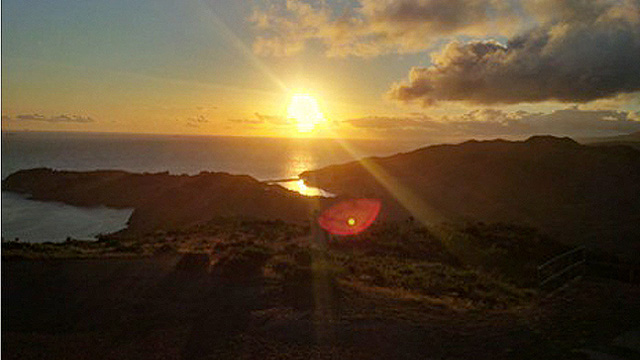
Related Articles:
<<













